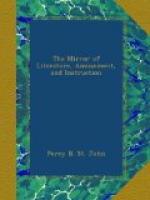Scotland gave birth to Thomas Campbell. He is the son of a second marriage, and was born at Glasgow, in 1777. His father was born in 1710, and was consequently nearly seventy years of age when the poet, his son, was ushered into the world. He was sent early to school, in his native place, and his instructor was Dr. David Alison, a man of great celebrity in the practice of education. He had a method of instruction in the classics purely his own, by which he taught with great facility, and at the same time rejected all harsh discipline, substituting kindness for terror, and alluring rather than compelling the pupil to his duty. Campbell began to write verse when young; and some of his earliest attempts at poetry are yet extant among his friends in Scotland. For his place of education he had a great respect, as well as for the memory of his masters, of whom he always spoke in terms of great affection. He was twelve years old when he quitted school for the University of Glasgow. There he was considered an excellent Latin scholar, and gained high honour by a contest with a candidate twice as old as himself, by which he obtained a bursary. He constantly bore away the prizes, and every fresh success only seemed to stimulate him to more ambitious exertions. In Greek he was considered the foremost student of his age; and some of his translations are said to be superior to any before offered for competition in the University. While there he made poetical paraphrases of the most celebrated Greek poets; of Aeschylus, Sophocles, and Aristophanes, which were thought efforts of extraordinary promise. Dr. Millar at that time gave philosophical lectures in Glasgow. He was a highly gifted teacher, and excellent man. His lectures attracted the attention of young Campbell, who became his pupil, and studied with eagerness the principles of sound philosophy; the poet was favoured with the confidence of his teacher, and partook much of his society.
Campbell quitted Glasgow to remove into Argyleshire, where a situation in a family of some note was offered and accepted by him. It was in Argyleshire,[2] among the romantic mountains of the north, that his poetical spirit increased, and the charms of verse took entire possession of his mind. Many persons now alive remember him wandering there alone by the torrent, or over the rugged heights of that wild country, reciting the strains of other poets aloud, or silently composing his own. Several of his pieces which he has rejected in his collected works, are handed about in manuscript in Scotland. We quote one of these wild compositions which has hitherto appeared only in periodical publications.
[2] For a view of this retreat, see the mirror No. 337.
* * * * *




